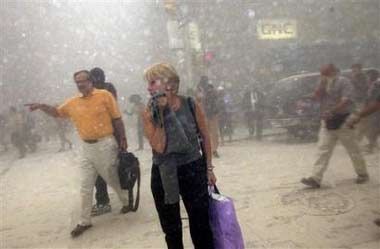A majority of survivors of the 2001 attacks that destroyed the World Trade
Center suffered from respiratory ailments and depression, anxiety and other
psychological problems up to three years later, federal health officials said
Friday.
|

People run from the collapse of the World
Trade Center Towers in New York in this Tuesday, Sept. 11, 2001, file
photo. [AP Photo]
|
The people who escaped from collapsed or damaged buildings on Sept. 11,
2001, were several times as likely to suffer from breathing problems or
psychological trauma if they were caught in the cloud of trade center dust and
debris that covered lower Manhattan, researchers at the U.S. Centers for Disease
Control and Prevention said.
"The trauma of being caught in the cloud itself, the whole experience had an
impact on their ... psychological health later on," said Dr. Robert M.
Brackbill, a CDC doctor working with the World Trade Center Health Registry,
which has been tracking the health of more than 71,000 people who worked at
ground zero or were in the area on Sept. 11.
Friday's study drew from preliminary interviews with 8,418 adults in the
registry who escaped from the twin towers, the collapsed Seven World Trade
Center and more than 30 buildings that suffered extensive damage on Sept. 11.
More than 70 percent escaped from the twin towers.
The interviews took place more than two years after the attacks, between
Sept. 5, 2003, and Nov. 20, 2004, and did not involve medical examinations.
Follow-up surveys are planned this month.
"We are just beginning to learn about the health effects of the worst day in
New York City's history," said Daniel Slippen, a survivor of the attacks and a
member of the registry's community advisory board. "It is critical to know
whether these physical and mental effects will continue, diminish or grow worse
over time."
City officials in charge of the registry say it will likely take 20 years or
more to determine whether 9/11 exposure led to increased cancer deaths or
illnesses among survivors.
The study said more than six in 10 were caught in the clouds of trade center
dust that enveloped the area. Those people were nearly three times as likely to
have respiratory problems, 40 percent more likely to experience severe
psychological problems and five times more likely to report suffering a stroke,
Brackbill said.
More than 56 percent of the survivors said they had new or worsening
respiratory ailments, including sinus problems, shortness of breath and a
persistent cough. More than 43 percent sustained a physical injury on Sept. 11;
the most common were eye injuries.
Almost all of the people studied witnessed at least three events likely to
cause psychological trauma, such as the collapse of the towers, the deaths or
injuries of others or people jumping from the twin towers, the study said.
More than 64 percent of the survivors said they were depressed, anxious or
had other emotional problems, and nearly 11 percent were in severe psychological
distress at the time of their interview, the study said.